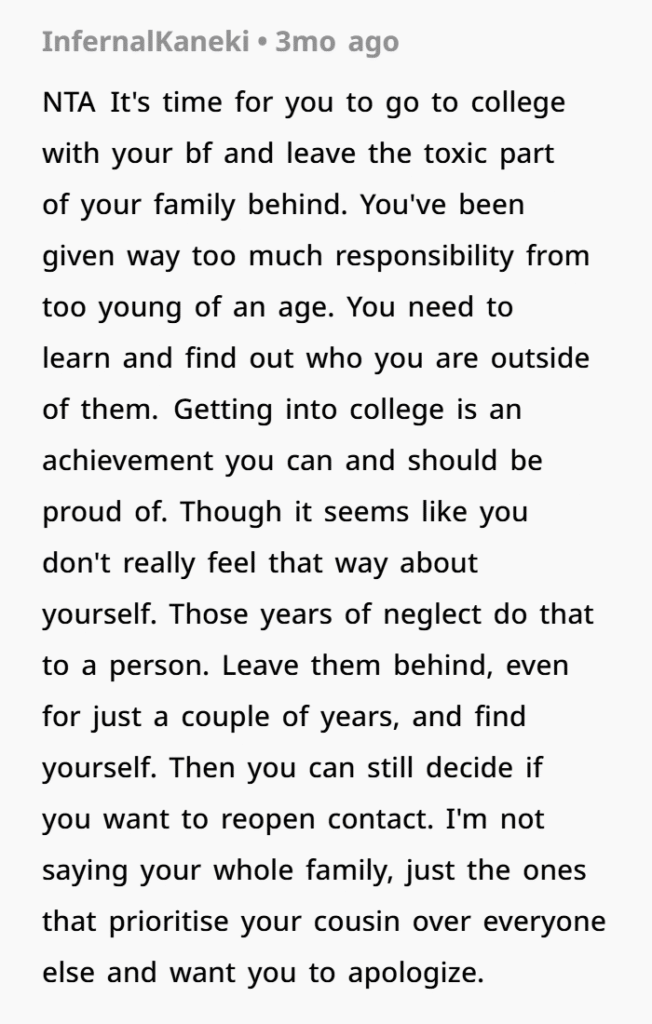Golden Child Cousin Steals the Spotlight at Teen’s Party Teen Finally Snaps After Being Pushed Too Far
I’ve spent my life watching my cousin, Camila, always being the “star” while I stayed in the shadows. Tonight was supposed to be different — my little celebration, my night. But she still found a way to hijack it. I snapped, called her out on her pattern, and now the whole family’s in chaos. Am I the bad guy here?
Growing up side by side, I was always taught to defer to her: “Let her have it, make her happy, don’t rock the boat.” Meanwhile, I cleaned, helped, did all the behind‑the‑scenes work. But no one seemed to notice me. So over time I swallowed the hurt. But tonight it all burst. And I wonder — was I unreasonable? Or was I finally standing for myself?
It’s not easy living with a “golden child,” but many of us really have to – and this doesn’t actually bring anything good

The author of the post has such a “golden child” too – her cousin, “Camila”











You’re dealing with some deep, sticky family dynamics here: attention competition, favoritism, identity overshadowing, boundary issues. Let’s unpack the layers, see what research says, and figure out where you go from here.
1. The hidden cost of living in someone’s shadow
When one family member is repeatedly elevated as “the gift,” “the talented one,” “the favorite,” it grates on everyone else’s psyche. Psychologists talk about sibling / cousin rivalry not just as petty fights but as long‑term struggles for identity, validation, and self‑worth.
You’ve been told from early on to defer. Even for things you didn’t do wrong — like when she fell and you got blamed. That builds a message: Your needs don’t matter. Her care matters more. Over time, that erodes your sense of self. You internalize that your role is supportive, background, never the star.
Meanwhile, Camila learns (or is taught) that she deserves the spotlight. She observes that her poem gets framed, her performances praised, her talents elevated, while your work is invisible. The family reinforces it. That gives her power — though it might come with insecurity too.
So tonight, when she read a poem — maybe it was genuinely something she felt — but in your context it read like the same old script: she turns occasions into stages, making it about her when it’s supposed to be someone else’s.
2. Attention seeking — is it always “bad”?
“Attention seeking” has a harsh ring, but let’s reframe it. People seek validation. We all do. The problem is when the strategies to get it harm relationships. In dysfunctional family systems, one person often becomes the “identified patient” or “sacred child” — the one who is excused, spoiled, paid attention to — and others fall into roles: the “rescuer,” the “invisible one.”
Camila might be seeking affirmation — “You see me, I’m worthy, I matter” — through performance and ceremonies. That doesn’t automatically make her mean. But when her methods override others’ feelings — like hers overwriting your celebration — it becomes toxic.
The question isn’t whether she seeks attention — we all do — but how she seeks it, and at whose expense.
3. Why you snapped — and what voice you reclaimed
You didn’t suddenly do something wrong tonight. You bottled years of invisibility, frustration, resentment. All that tension was underneath.

When she got up and read that poem (about “growth,” “new chapters”) in your dinner, in front of your family, you realized: she was making it about her again, turning your win into her stage. That triggered all the old hurts: “Let it go, don’t complain, don’t demand your day.” And you snapped.
That snap was boundary enforcement. You said, No more stealing my moment. You demanded space for your voice. The family system recoils when a hidden voice speaks. That’s why everyone got upset.
You might’ve hurt her feelings, yes. But this confrontation also calls into question the family’s pattern: Who deserves to be seen? Whose achievements are valid? You shook the foundation.
4. Could you have done it better — what research and wise voices say
Yes — confrontation is messy, relationships are delicate, and timing, tone, context matter. Here’s how you could have expressed your boundary with less fire — and still validly:
- Use “I feel / I need” language
Instead of “You always do this”, you might say: “I feel overshadowed when things become about you. Tonight was supposed to be about me.” Softening doesn’t erase power — it helps others receive it. - Ask for a moment before speaking publicly
If you’d asked her (or her mom) “Can I say something?” before you snapped, you’d have gained some control over tone and setting. - Express empathy, even while confronting
“I know you probably didn’t intend to, but this pattern hurts me.” That bridges, doesn’t escalate. - Pick your arena — maybe not the middle of everyone
Some conversations are better in private. The backlash from grandma, mom, her mom was predictable in the public forum. - Prepare for fallout
When people pushing for status are challenged, they double down. You expected this — and you have to guard yourself emotionally.
In terms of psychological models, conflict resolution experts suggest assertive communication is ideal — not aggressive (attacks) nor passive (silence), but clear, honest, respectful. Also, family systems theory warns: when one person changes (you asserting), the system resists — it wants to restore balance (i.e. keep Camila in the spotlight, you in the background) and may punish you to “teach you your place.”
5. Your boundaries, your identity, your self worth
You deserve to be seen — not only to others, but to yourself. That means owning your achievements without guilt. Letting people notice you for cleaning behind scenes or taking care of others doesn’t lessen its value.
Boundaries are your right. You can say “Tonight is my celebration — please don’t hijack it.” You can say “I need you to respect this moment.” You’re allowed to protect your mental space from habitual spotlight robbing.

Also, identity work matters. You need to internalize that your worth doesn’t depend on her absence or her being silent. You exist. You matter, even if no one applauds. That’s part of the healing.
6. What might happen now, and how to move with purpose
Here’s the stakes. The fallout may include:
- Fam backlash: Grandma, her mom may pressure you to apologize, isolate you, cast you as the troublemaker.
- Cutting ties or distancing: Camila has unfollowed you. She may push distance to maintain her narrative.
- Emotional guilt: You might doubt yourself, replay your words, regret tone.
But here’s what you can choose:
- No forced apology — unless you truly reflect and feel sorry for the how, not necessarily the what. If your words (tone, delivery) hurt more than necessary, fine — apologize for that, not for owning your pain.
- Request a mediated conversation — maybe with a calm aunt, your mom, or a counselor as a neutral party. A space where both can speak and be heard.
- Stand firm on your boundary — you don’t have to acquiesce to pressure. If asked to retract, say, “I will discuss when we can all talk respectfully.”
- Cultivate your support outside the system — talk to friends, possibly a counselor or therapist. Validate your feelings.
- Be ready for forgiveness or non-reconciliation — maybe Camila never sees your side. But you can reclaim peace regardless.
You planted a seed — a possibility that your life matters, not just her narrative. It may take years for that seed to grow. But the moment you claimed it, you began shifting everything.
So… Did You Go Too Far?
No — you didn’t go too far in speaking your truth. You might have gone too hard in that moment. But that’s human. Your emotion was pent up. You are allowed to hurt, to demand being seen, to reject being muted.

You are not the villain. You are a person who has had her voice minimized. You exploded. That’s messy, but necessary.
If Camila and your family value you, they’ll have to reckon with that. They’ll resist. But the only way for real balance is for voices to shift.
You might patch things with time, make amends for tone, rebuild relations — but let your healing come first. Let your voice echo. Let your presence demand acknowledgment.
If you like, I can map out a step-by-step plan to rebuild with Camila (or heal without her) — communication scripts, emotional guardrails, ways to protect yourself. Do you want me to send that?
Many commenters sided with the author, urging her to go on living her life and stop thinking about her cousin








